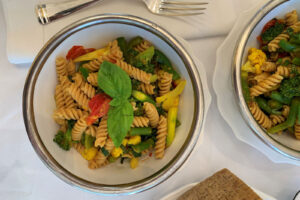
Legacies of Chemical Warfare
More than 50 years after the Vietnam War, U.S. herbicide warfare programs have been associated with numerous health risks in veterans and civilians.

8.
Good Genes: In a Swedish preclinical study of patients with clear-cell kidney cancer, researchers found the activity of four specific genes in the patients’ cancer cells may be able to predict the risk of tumors spreading to the skeleton, occurring in one-third of cases. The research will help scientists better understand the interaction between tumors and their microenvironment.
9.
Hand in Hand: Moderna and Merck have announced that together they will develop and sell a personalized cancer vaccine for individual patients. Moderna’s messenger RNA vaccine technology will be studied along with Merck’s Keytruda to treat patients with high-risk melanoma.
7.
Embrace Your Curls: Be careful of chemical hair-straightening products. A study by the National Institute of Environmental Health Sciences followed almost 35,000 women between age 35 and 74 to monitor risk factors for breast cancer and other conditions, and found that women who frequently used hair-straightening products were more than twice as likely to develop uterine cancer.
8.
Good Genes: In a Swedish preclinical study of patients with clear-cell kidney cancer, researchers found the activity of four specific genes in the patients’ cancer cells may be able to predict the risk of tumors spreading to the skeleton, occurring in one-third of cases. The research will help scientists better understand the interaction between tumors and their microenvironment.
9.
Hand in Hand: Moderna and Merck have announced that together they will develop and sell a personalized cancer vaccine for individual patients. Moderna’s messenger RNA vaccine technology will be studied along with Merck’s Keytruda to treat patients with high-risk melanoma.
6.
Mediterranea-yum!: Researchers concluded that a Mediterranean diet rich in fiber, mono-unsaturated fatty acids (found in oils, nuts and fish) and polyphenols (found in vegetables, fruit and whole grains) has been associated with a major improved response to immunotherapy drugs, called immune checkpoint inhibitors, in melanoma patients. This diet was also associated with progression-free survival at 12 months.
7.
Embrace Your Curls: Be careful of chemical hair-straightening products. A study by the National Institute of Environmental Health Sciences followed almost 35,000 women between age 35 and 74 to monitor risk factors for breast cancer and other conditions, and found that women who frequently used hair-straightening products were more than twice as likely to develop uterine cancer.
8.
Good Genes: In a Swedish preclinical study of patients with clear-cell kidney cancer, researchers found the activity of four specific genes in the patients’ cancer cells may be able to predict the risk of tumors spreading to the skeleton, occurring in one-third of cases. The research will help scientists better understand the interaction between tumors and their microenvironment.
9.
Hand in Hand: Moderna and Merck have announced that together they will develop and sell a personalized cancer vaccine for individual patients. Moderna’s messenger RNA vaccine technology will be studied along with Merck’s Keytruda to treat patients with high-risk melanoma.
5.
Put to the Test: A molecular test that distinguishes between benign and malignant cysts shows promising results for pancreatic cancer. Funded by the U.S. National Cancer Institute, the Pancreatic Cancer Action Network and others, PancreaSeq will help improve early detection of pancreatic cancer and avoid overtreatment.
6.
Mediterranea-yum!: Researchers concluded that a Mediterranean diet rich in fiber, mono-unsaturated fatty acids (found in oils, nuts and fish) and polyphenols (found in vegetables, fruit and whole grains) has been associated with a major improved response to immunotherapy drugs, called immune checkpoint inhibitors, in melanoma patients. This diet was also associated with progression-free survival at 12 months.
7.
Embrace Your Curls: Be careful of chemical hair-straightening products. A study by the National Institute of Environmental Health Sciences followed almost 35,000 women between age 35 and 74 to monitor risk factors for breast cancer and other conditions, and found that women who frequently used hair-straightening products were more than twice as likely to develop uterine cancer.
8.
Good Genes: In a Swedish preclinical study of patients with clear-cell kidney cancer, researchers found the activity of four specific genes in the patients’ cancer cells may be able to predict the risk of tumors spreading to the skeleton, occurring in one-third of cases. The research will help scientists better understand the interaction between tumors and their microenvironment.
9.
Hand in Hand: Moderna and Merck have announced that together they will develop and sell a personalized cancer vaccine for individual patients. Moderna’s messenger RNA vaccine technology will be studied along with Merck’s Keytruda to treat patients with high-risk melanoma.
4.
Seek a Screen: Doctors and oncologists have noted a rise in breast cancer diagnoses in younger people. According to the CDC, most breast cancer diagnoses occur in women over 50, but one in 10 women diagnosed are under the age of 45. Every person with breasts, not just those over age 50, should pay attention to their bodies and get screened.
5.
Put to the Test: A molecular test that distinguishes between benign and malignant cysts shows promising results for pancreatic cancer. Funded by the U.S. National Cancer Institute, the Pancreatic Cancer Action Network and others, PancreaSeq will help improve early detection of pancreatic cancer and avoid overtreatment.
6.
Mediterranea-yum!: Researchers concluded that a Mediterranean diet rich in fiber, mono-unsaturated fatty acids (found in oils, nuts and fish) and polyphenols (found in vegetables, fruit and whole grains) has been associated with a major improved response to immunotherapy drugs, called immune checkpoint inhibitors, in melanoma patients. This diet was also associated with progression-free survival at 12 months.
7.
Embrace Your Curls: Be careful of chemical hair-straightening products. A study by the National Institute of Environmental Health Sciences followed almost 35,000 women between age 35 and 74 to monitor risk factors for breast cancer and other conditions, and found that women who frequently used hair-straightening products were more than twice as likely to develop uterine cancer.
8.
Good Genes: In a Swedish preclinical study of patients with clear-cell kidney cancer, researchers found the activity of four specific genes in the patients’ cancer cells may be able to predict the risk of tumors spreading to the skeleton, occurring in one-third of cases. The research will help scientists better understand the interaction between tumors and their microenvironment.
9.
Hand in Hand: Moderna and Merck have announced that together they will develop and sell a personalized cancer vaccine for individual patients. Moderna’s messenger RNA vaccine technology will be studied along with Merck’s Keytruda to treat patients with high-risk melanoma.
3.
Diversifying Medicine: The Harper Cancer Research Institute partnered with the Pokagon Band of Potawatomi Indians to raise awareness about early detection in Native American communities. This will address disparities in treatment outcomes and help researchers diversify cancer tissue samples to create more personalized medicine for people of all races and ethnicities.
4.
Seek a Screen: Doctors and oncologists have noted a rise in breast cancer diagnoses in younger people. According to the CDC, most breast cancer diagnoses occur in women over 50, but one in 10 women diagnosed are under the age of 45. Every person with breasts, not just those over age 50, should pay attention to their bodies and get screened.
5.
Put to the Test: A molecular test that distinguishes between benign and malignant cysts shows promising results for pancreatic cancer. Funded by the U.S. National Cancer Institute, the Pancreatic Cancer Action Network and others, PancreaSeq will help improve early detection of pancreatic cancer and avoid overtreatment.
6.
Mediterranea-yum!: Researchers concluded that a Mediterranean diet rich in fiber, mono-unsaturated fatty acids (found in oils, nuts and fish) and polyphenols (found in vegetables, fruit and whole grains) has been associated with a major improved response to immunotherapy drugs, called immune checkpoint inhibitors, in melanoma patients. This diet was also associated with progression-free survival at 12 months.
7.
Embrace Your Curls: Be careful of chemical hair-straightening products. A study by the National Institute of Environmental Health Sciences followed almost 35,000 women between age 35 and 74 to monitor risk factors for breast cancer and other conditions, and found that women who frequently used hair-straightening products were more than twice as likely to develop uterine cancer.
8.
Good Genes: In a Swedish preclinical study of patients with clear-cell kidney cancer, researchers found the activity of four specific genes in the patients’ cancer cells may be able to predict the risk of tumors spreading to the skeleton, occurring in one-third of cases. The research will help scientists better understand the interaction between tumors and their microenvironment.
9.
Hand in Hand: Moderna and Merck have announced that together they will develop and sell a personalized cancer vaccine for individual patients. Moderna’s messenger RNA vaccine technology will be studied along with Merck’s Keytruda to treat patients with high-risk melanoma.
2.
Fungus Among Us: Research from the Weizmann Institute of Science in Israel and the University of California, San Diego have found fungi in all 35 types of cancer studied. Other studies found people with certain species of fungi in their cancerous tumors had worse health outcomes. These findings can help researchers better understand the role of fungi in cancer cells.
3.
Diversifying Medicine: The Harper Cancer Research Institute partnered with the Pokagon Band of Potawatomi Indians to raise awareness about early detection in Native American communities. This will address disparities in treatment outcomes and help researchers diversify cancer tissue samples to create more personalized medicine for people of all races and ethnicities.
4.
Seek a Screen: Doctors and oncologists have noted a rise in breast cancer diagnoses in younger people. According to the CDC, most breast cancer diagnoses occur in women over 50, but one in 10 women diagnosed are under the age of 45. Every person with breasts, not just those over age 50, should pay attention to their bodies and get screened.
5.
Put to the Test: A molecular test that distinguishes between benign and malignant cysts shows promising results for pancreatic cancer. Funded by the U.S. National Cancer Institute, the Pancreatic Cancer Action Network and others, PancreaSeq will help improve early detection of pancreatic cancer and avoid overtreatment.
6.
Mediterranea-yum!: Researchers concluded that a Mediterranean diet rich in fiber, mono-unsaturated fatty acids (found in oils, nuts and fish) and polyphenols (found in vegetables, fruit and whole grains) has been associated with a major improved response to immunotherapy drugs, called immune checkpoint inhibitors, in melanoma patients. This diet was also associated with progression-free survival at 12 months.
7.
Embrace Your Curls: Be careful of chemical hair-straightening products. A study by the National Institute of Environmental Health Sciences followed almost 35,000 women between age 35 and 74 to monitor risk factors for breast cancer and other conditions, and found that women who frequently used hair-straightening products were more than twice as likely to develop uterine cancer.
8.
Good Genes: In a Swedish preclinical study of patients with clear-cell kidney cancer, researchers found the activity of four specific genes in the patients’ cancer cells may be able to predict the risk of tumors spreading to the skeleton, occurring in one-third of cases. The research will help scientists better understand the interaction between tumors and their microenvironment.
9.
Hand in Hand: Moderna and Merck have announced that together they will develop and sell a personalized cancer vaccine for individual patients. Moderna’s messenger RNA vaccine technology will be studied along with Merck’s Keytruda to treat patients with high-risk melanoma.
1.
Fighter T: Researchers at Johns Hopkins University are developing a vaccine to train T-cells to recognize and kill cells that have one of the six gene mutations that causes pancreatic cancer. The first clinical trial included 12 patients with pancreatic cancer who were treated with surgery. Two years later, these patients are still cancer-free!
2.
Fungus Among Us: Research from the Weizmann Institute of Science in Israel and the University of California, San Diego have found fungi in all 35 types of cancer studied. Other studies found people with certain species of fungi in their cancerous tumors had worse health outcomes. These findings can help researchers better understand the role of fungi in cancer cells.
3.
Diversifying Medicine: The Harper Cancer Research Institute partnered with the Pokagon Band of Potawatomi Indians to raise awareness about early detection in Native American communities. This will address disparities in treatment outcomes and help researchers diversify cancer tissue samples to create more personalized medicine for people of all races and ethnicities.
4.
Seek a Screen: Doctors and oncologists have noted a rise in breast cancer diagnoses in younger people. According to the CDC, most breast cancer diagnoses occur in women over 50, but one in 10 women diagnosed are under the age of 45. Every person with breasts, not just those over age 50, should pay attention to their bodies and get screened.
5.
Put to the Test: A molecular test that distinguishes between benign and malignant cysts shows promising results for pancreatic cancer. Funded by the U.S. National Cancer Institute, the Pancreatic Cancer Action Network and others, PancreaSeq will help improve early detection of pancreatic cancer and avoid overtreatment.
6.
Mediterranea-yum!: Researchers concluded that a Mediterranean diet rich in fiber, mono-unsaturated fatty acids (found in oils, nuts and fish) and polyphenols (found in vegetables, fruit and whole grains) has been associated with a major improved response to immunotherapy drugs, called immune checkpoint inhibitors, in melanoma patients. This diet was also associated with progression-free survival at 12 months.
7.
Embrace Your Curls: Be careful of chemical hair-straightening products. A study by the National Institute of Environmental Health Sciences followed almost 35,000 women between age 35 and 74 to monitor risk factors for breast cancer and other conditions, and found that women who frequently used hair-straightening products were more than twice as likely to develop uterine cancer.
8.
Good Genes: In a Swedish preclinical study of patients with clear-cell kidney cancer, researchers found the activity of four specific genes in the patients’ cancer cells may be able to predict the risk of tumors spreading to the skeleton, occurring in one-third of cases. The research will help scientists better understand the interaction between tumors and their microenvironment.
9.
Hand in Hand: Moderna and Merck have announced that together they will develop and sell a personalized cancer vaccine for individual patients. Moderna’s messenger RNA vaccine technology will be studied along with Merck’s Keytruda to treat patients with high-risk melanoma.
1.
Fighter T: Researchers at Johns Hopkins University are developing a vaccine to train T-cells to recognize and kill cells that have one of the six gene mutations that causes pancreatic cancer. The first clinical trial included 12 patients with pancreatic cancer who were treated with surgery. Two years later, these patients are still cancer-free!
2.
Fungus Among Us: Research from the Weizmann Institute of Science in Israel and the University of California, San Diego have found fungi in all 35 types of cancer studied. Other studies found people with certain species of fungi in their cancerous tumors had worse health outcomes. These findings can help researchers better understand the role of fungi in cancer cells.
3.
Diversifying Medicine: The Harper Cancer Research Institute partnered with the Pokagon Band of Potawatomi Indians to raise awareness about early detection in Native American communities. This will address disparities in treatment outcomes and help researchers diversify cancer tissue samples to create more personalized medicine for people of all races and ethnicities.
4.
Seek a Screen: Doctors and oncologists have noted a rise in breast cancer diagnoses in younger people. According to the CDC, most breast cancer diagnoses occur in women over 50, but one in 10 women diagnosed are under the age of 45. Every person with breasts, not just those over age 50, should pay attention to their bodies and get screened.
5.
Put to the Test: A molecular test that distinguishes between benign and malignant cysts shows promising results for pancreatic cancer. Funded by the U.S. National Cancer Institute, the Pancreatic Cancer Action Network and others, PancreaSeq will help improve early detection of pancreatic cancer and avoid overtreatment.
6.
Mediterranea-yum!: Researchers concluded that a Mediterranean diet rich in fiber, mono-unsaturated fatty acids (found in oils, nuts and fish) and polyphenols (found in vegetables, fruit and whole grains) has been associated with a major improved response to immunotherapy drugs, called immune checkpoint inhibitors, in melanoma patients. This diet was also associated with progression-free survival at 12 months.
7.
Embrace Your Curls: Be careful of chemical hair-straightening products. A study by the National Institute of Environmental Health Sciences followed almost 35,000 women between age 35 and 74 to monitor risk factors for breast cancer and other conditions, and found that women who frequently used hair-straightening products were more than twice as likely to develop uterine cancer.
8.
Good Genes: In a Swedish preclinical study of patients with clear-cell kidney cancer, researchers found the activity of four specific genes in the patients’ cancer cells may be able to predict the risk of tumors spreading to the skeleton, occurring in one-third of cases. The research will help scientists better understand the interaction between tumors and their microenvironment.
9.
Hand in Hand: Moderna and Merck have announced that together they will develop and sell a personalized cancer vaccine for individual patients. Moderna’s messenger RNA vaccine technology will be studied along with Merck’s Keytruda to treat patients with high-risk melanoma.

More than 50 years after the Vietnam War, U.S. herbicide warfare programs have been associated with numerous health risks in veterans and civilians.

I feel like my story is a little bit boring. I’m like a shark. I just keep going.

In her latest cW Recipe, blogger Lindsay Yarrow shares a deliciously quick pasta packed with cancer-fighting foods.

Millennials can feel left behind in the cancer community when receiving a diagnosis in the prime of their life, especially in comparison to their younger or older counterparts. Stupid Cancer is changing that.

Drowsiness can be a doozy. Oncology nurse, personal trainer and exercise specialist Jenny Spencer is working to help warriors cope with cancer-related fatigue through fitness.